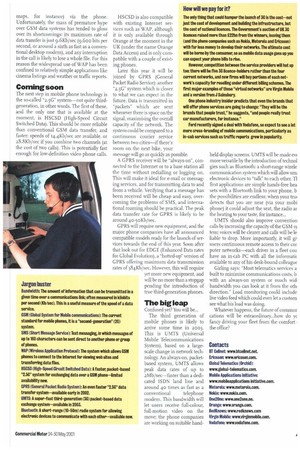How will we pay for it
Page 41

If you've noticed an error in this article please click here to report it so we can fix it.
The only thing that could hamper the launch of 30 is the cost—not just the cost of development and building the infrastructure, but the cost of national licences. The Government's auction of UK 3G licences raised more than 122bn from the winners, leaving them (and the phone companies such as Nokia, Motorola and Ericsson) with far less money to develop their networks. The ultimate cost will be borne by the consumer, so as mobile data usage goes up you can expect your phone bills to rise.
However, competition between the service providers will hot up too: there will be five 30 licence-holders rather than the four current networks, and new firms will buy portions of each network's capacity for reselling under different billing schemes. The first major examples of these "virtual networks" are Virgin Mobile and a version from J Sainsbury.
One phone industry insider predicts that even the brands that will offer phone services are going to change: "They will be the brands that people trust," he suggests, "and people really trust car manufacturers, for instance."
Ford recently signed a deal with Vodafone, so expect to see a lot more cross-branding of mobile communications, particularly as in-cab services such as traffic reports grow in popularity.




























































































































